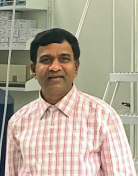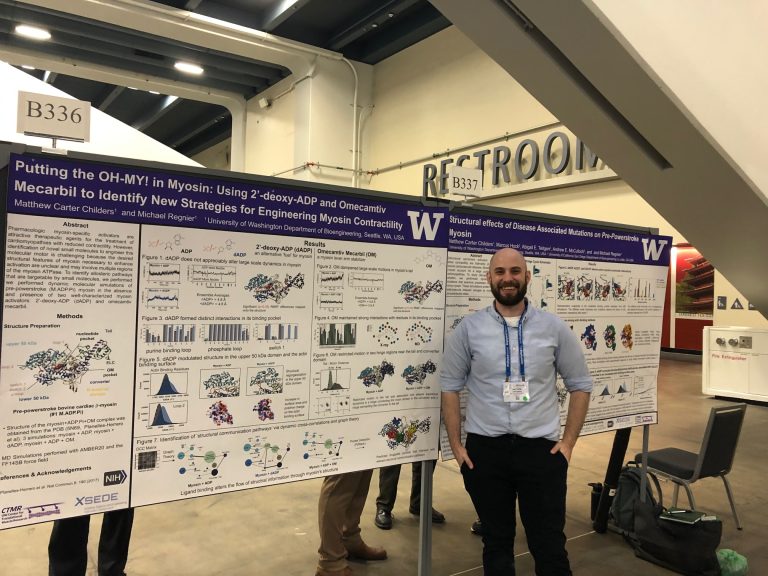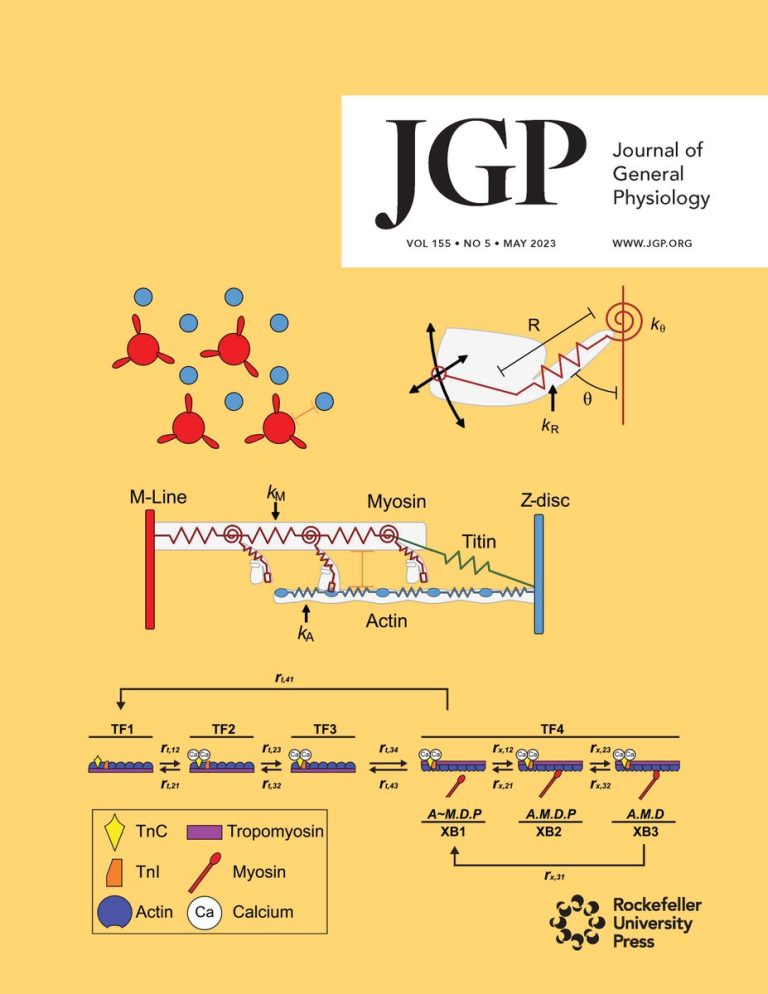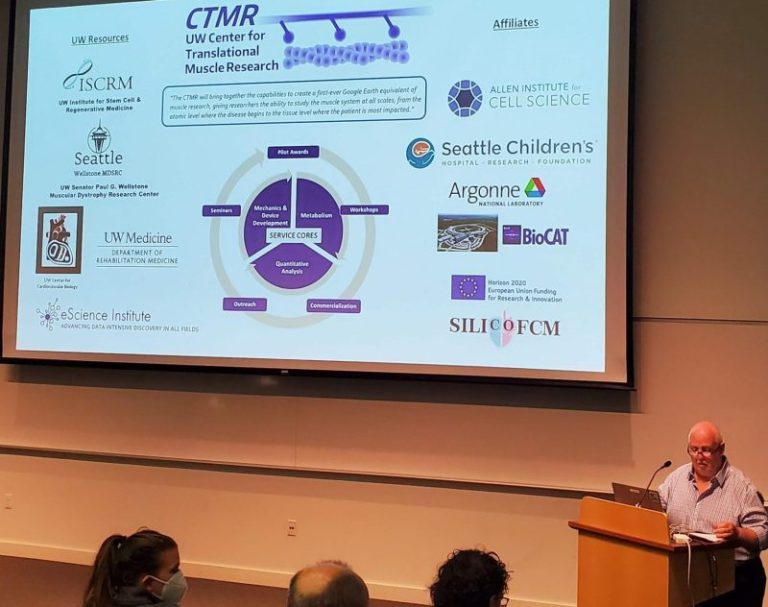Congratulations to our 2021 Pilot Grant Program Awardees
The UW Center for Translational Muscle Research (CTMR) is delighted to announce that three exciting pilot grants have been awarded as part of the 2021 Pilot Grant Program. The CTMR Pilot Grant Program provides funding to support the development of exciting new muscle research on campus by allowing investigators to (1) obtain preliminary data needed to apply for follow-on funding and/or (2) receive training in new skills.
The three awarded projects are:
- “Metabolomics approach to characterize the effects of androgen deprivation therapy on skeletal muscle in prostate cancer patients” (PI: Dr. Lindsey Anderson, UW Gerontology and Geriatric Medicine)
- “The role of mitochondrial metabolism on quiescent muscle stem cell proliferation and myogenesis” (PI: Dr. Fausto Carnevale Neto, UW Anesthesiology & Pain Medicine)
- “Probing Energetics of Muscle Metabolism Using 31P NMR Metabolomics” (PI: Dr. G. A. Nagana Gowda, UW Anesthesiology & Pain Medicine)
Read more about each of these exciting projects below!

Dr. Lindsey Anderson is an Acting Instructor at the University of Washington Department of Medicine’s Division of Gerontology and Geriatric Medicine.
Dr. Anderson’s Pilot Project entitled, “Metabolomics approach to characterize the effects of androgen deprivation therapy on skeletal muscle in prostate cancer patients”, seeks to establish the role of androgen-dependent molecular pathways leading to Androgen deprivation therapy (ADT)-induced sarcopenia in men with Prostate cancer.
Prostate cancer is the most common cancer among men. Androgen deprivation therapy (ADT), which minimizes endogenous androgen (i.e. testosterone) production, is the standard treatment for advanced/metastatic prostate cancer with~400,000 men on ADT in the U.S. ADT induces a decrease in muscle mass/performance, or sarcopenia, which leads to poor quality of life and increased fatigue and mortality. To date, mechanisms underlying ADT-induced sarcopenia remain unknown and constitute a significant barrier to therapeutic development.
By comparing the muscle biopsies and blood samples of men with prostate cancer before and after undergoing ADT, Dr. Anderson aims to identify mechanisms underlying ADT-related sarcopenia as potential targets for future interventional clinical trials.

Dr. Fausto Carnevale Neto is an Acting Instructor at the University of Washington Department of Anesthesiology & Pain Medicine.
Dr. Neto’s Pilot Project entitled, “The role of mitochondrial metabolism on quiescent muscle stem cell proliferation and myogenesis”, seeks to investigate how metabolism modulates muscle stem cell homeostasis and regenerative turn over.
Skeletal muscle has the inherently ability to regenerate following acute injury. While adult skeletal muscle can adapt its mass and volume under certain conditions, myogenesis, or the formation of new skeletal muscle tissue, relies on muscle stem cells. These stem cells normally are in an inactive or quiescent state, but upon injury or other triggers, they can expand and acquire distinct cell types, such as new muscle cells, or self-renew to restock the pool of homeostatic quiescent stem cells. Little is known about the mechanisms that control muscle stem cell homeostasis and regenerative turnover. However, in certain diseases or aging, they progressively lose stem-cell quiescence capabilities, leading to decline in muscle strength and function.
By manipulating culture conditions that regulate cell cycles of homogeneous populations of quiescent muscle cells and their mitochondria, Dr. Neto will examine and compare the metabolic mechanisms at both the cellular and subcellular (isolated mitochondria) levels governing muscle stem cell self-renewal and differentiation. Expanding our knowledge about metabolite diversity and function impacting muscle stem cell fate could be used to guide new therapeutic strategies that modulate muscle function during aging and disease.

Dr. G. A. Nagana Gowda is a Research Associate Professor at the University of Washington’s Department of Anesthesiology & Pain Medicine.
Dr. Gowda’s Pilot project, entitled “Probing Energetics of Muscle Metabolism Using 31P NMR Metabolomics”, seeks to develop a simplified method to analyze the metabolites associated with cellular energetics.
The metabolic products, or metabolites, of cellular energetics power life, health, and aging. As we age, levels of these metabolites decline substantially, leaving us at a greater risk for a multitude of muscular as well as other diseases. Despite the critical need to investigate muscle metabolism and energetics for understanding human health and diseases, currently, no simple method is available to profile the expanded pool of metabolites in one step. Due to numerous technical challenges, including the need to measure different metabolites one by one, the performance of the current methods including the highly sensitive mass spectrometry method are unsuitable.
Dr. Gowda proposes developing a 31P-NMR metabolomics method to profile a wide range of metabolites (>30) of cellular energetics including NAD+, NADH, NADP+,NADPH, ATP, ADP and AMP, and the associated glycolysis and pentose phosphate pathway metabolites. This new method could then be applied to probe changes in muscle metabolism using skeletal muscle tissue and blood, that are linked to aging. Additionally, this study will fill an important knowledge gap, which is the metabolic link between muscle metabolism and blood metabolite levels, and offer a new tool for basic research and translational studies.





